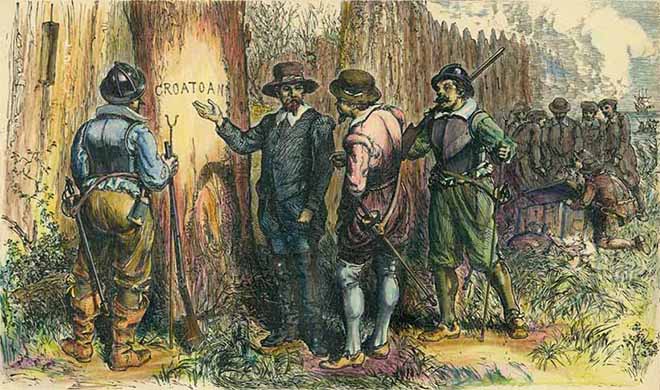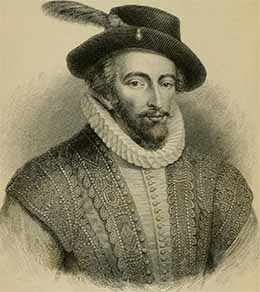History of The Lost Colony of Roanoke
Story | Legend | Mystery | Theories

The history of the lost colony of Roanoke began in 1584 when Sir Walter Raleigh, a brilliant gentleman of the English court and famous explorer, commissioned an expedition to locate a suitable site for the establishment of a permanent colony in North America. Its chiefs found the perfect spot on the shores of present-day North Carolina, in what are now called Outer Banks. The short history of Roanoke, the first English colony in the New World, was marked by barbarism, racism and religious fanaticism of the so-called "civilized" English towards the natives Algonquin, primitive nation or supposed to be.
Roanoke story, a pirates nation

Queen Elizabeth had commissioned Raleigh to create a colony in the New World, but she had given him only ten years to do so. In view of the difficulties of the enterprise - the 5,000 kilometers of the Atlantic and its storms, the possible hostility of the American Indians, and that of Spaniards already established in the Caribbean and South America - the task was overwhelming. At the beginning of the 1580s, England and Spain were on the verge of war: the very Catholic Spain considered the English Protestants as infamous heretics, while, for their part, the English eagerly eyed the gold and the money that the Spaniards brought back from America by whole galleons. English sailors were only waiting for one thing, that the war was officially declared to be able to run on Spanish galleons. A port colony would have been an ideal starting point for corsairs.
The savages attack
In the spring of 1585, seventy-five men, mostly former soldiers, were landed on Roanoke island. Alas, they behaved like soldiers against the Algonquins. They were friendly, but relations degenerate very quickly. After a visit to an Indian village, the English found that they lacked a silver bowl. Persuaded that it had been stolen from them by the Algonquins, they returned to the village to chastise these "primitive savages". They burned their leader and set the village on fire. Without finding their silver bowl.
After a very difficult year - surrounded by now hostile Indians and no news of the ships supposed to supply them - the Roanoke settler soldiers took advantage of the passage of Francis Drake's fleet in the area to be repatriated. Arriving at the scene a month later, Raleigh's ships found the Roanoke colony abandoned. They left fifteen men on the spot then resumed to sea.
When the next contingent - 117 settlers in total - arrived a year later, the fifteen men had disappeared. The Croatan, an Indian tribe living on a neighboring island, who had maintained good relations with the English, told them that their compatriots had been attacked by an unknown tribe: nine of them, having survived, had fled aboard a boat, and no one had ever seen them again. It was under these dark auspices that the lost colony of Roanoke island was officially founded on July 22, 1587.
Sad birthday
On August 18, 1587, a woman from the Roanoke colony, Eleanor Dare, gave birth to a little girl whom she named Virginia; it was the first English child born on American soil. Shortly after, a Roanoke settler was killed by the Indians. Convinced that this murder was the prelude to an imminent attack, the settlers sent their governor, John White (Little Virginia's grandfather) to England, to recruit new soldiers. He left on the only ship available to the colony, leaving the hundred and sixteen Roanoke settlers without any means of leaving the island.
But the outbreak of the war between England and Spain delayed the return of the governor by almost three years. When he finally arrived at Roanoke island on August 18, 1590, the day of his granddaughter's third birthday, he found the colony completely abandoned.
Lost colony of Roanoke theories
What happened to the Roanoke settlers ? The clues are meager, but we can make some assumptions. John White found no graves or human remains in the colony. It seems unlikely that its inhabitants were massacred by the Indians: why would they have taken away the bodies? Whatever might be thought of by many Europeans at that time, the Algonquins were not cannibals.
Alternatively, the Spaniards - at war with England - would have captured Roanoke settlers and enslaved them. But Spanish archives show that they completely ignored the existence of the Roanoke colony.
John White found two inscriptions engraved on trees of the colony: CROATAN and CRO. Would the colonists have been kidnapped by the Croatan, or would they have placed themselves under their protection? In 1587, the Croatan were the only tribe in the region that maintained a friendly attitude toward the English; we can therefore hope that the departure of the Roanoke settlers was voluntary and not forced. But in 1590, the Croatan had gone to the mainland, and they were out of reach of White and his men.
Later, English settlers noted that some Algonquins in Carolina looked like "whites". There is little hope, however, that DNA studies help to unravel the mystery of Roanoke. The Algonquin tribes of Caroline were destroyed in a few generations by diseases and weapons brought from Europe by the following waves of settlers. Climate studies have also shown that the period 1587-1589 was marked by the worst drought known by America in 800 years. Did the Roanoke settlers, dying of hunger, surrender to the mercy and charity of the Indians?









































































































































































































































































































































